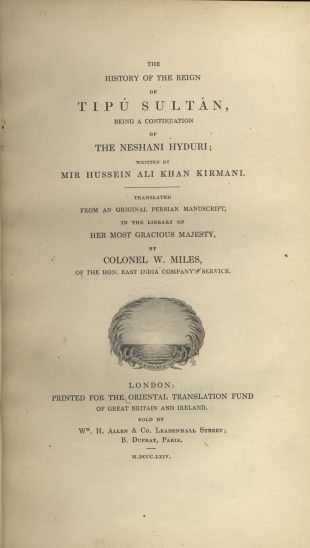The History of the Reign of Tipu Sultan. Being a continuation of the Neshani Hyduri.
Kirmani, Mir Hussein Ali Khan.
Synopsis
Sultan Fateh Ali Tippu (1750 -1799), also known as the Tiger of Mysore, was the de facto ruler of the Indian Kingdom of Mysore from 1782 (the time of his father’s death) until his own demise in 1799. He was the first son of Hyder Ali by his second wife, Fatima or Fakhr-un-nissa. His full name is Sultan Fateh Ali Khan Shahab or Tipu Saheb Tippu Sultan, in addition to his role as ruler, was a scholar, soldier, and poet. He was a devout Muslim but the majority of his subjects were Hindus. At the request of the French, he built a church, the first in Mysore. In alliance with the French in their struggle with the British both Tippu Sultan and Hyder Ali did not hesitate to use their French trained army against the Marathas, Sira, Malabar, Coorg and Bednur. He was proficient in many languages. He helped his father Hyder Ali defeat the British in the Second Mysore War, and negotiated the Treaty of Mangalore with them. However, he was defeated in the Third Anglo-Mysore War and in the Fourth Anglo-Mysore War by the combined forces of the British East India Company, the Nizam of Hyderabad and to a lesser extent, Travancore. Tippu Sultan died defending his capital Srirangapattana, on 4 May, 1799.








